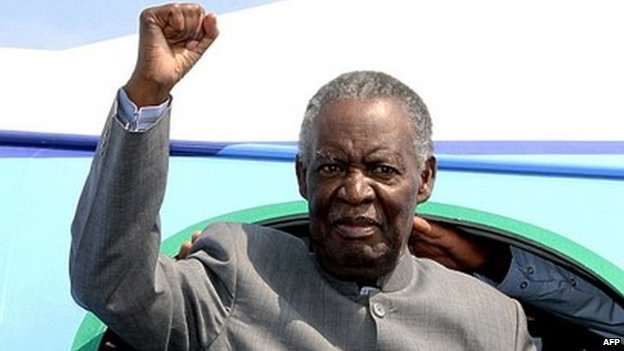Obituary: Sata: Forceful, fearless leader

Lusaka — The supporters of Michael Sata viewed him as a man of action from humble origins, who defended the poor. But the Zambian president’s critics viewed him as an abrasive and authoritarian figure.
Sata, who died in London on Tuesday evening at 77, ruled the southern African country — the continent’s second-largest copper producer after the Democratic Republic of Congo — since 2011.
Gravelly-voiced as a result of years of chain-smoking, he was a seasoned and astute politician.
Some Zambians loved him, others loathed him — but in his prime, Sata was a charismatic and witty speaker.
“I would rather go to prison on behalf of the people of Zambia than keep quiet,” he once said.
Born in rural Mpika in the north, Sata had little formal education. He served as a policeman in Zambia’s British colonial administration before being elected a councillor and later governor in the post-independence government of President Kenneth Kaunda.
After Zambia’s independence from Britain in 1964, Sata worked his way up the ruling United National Independence Party. He became popular for his hands-on approach, including cleaning streets himself.
He later distanced himself from Kaunda and joined the Movement for Multiparty Democracy (MMD), whose campaign led to the first multi-party elections in 1991.
Under MMD governments, Sata served as minister of Local government, Labour, Health and as minister without portfolio.
He was a popular health minister and credited with improving the working conditions for doctors and nurses.
When the MMD thwarted his presidential ambitions, he broke away to form the Patriotic Front (PF) in 2001. Sata finally achieved his life-long ambition to be president at his fourth attempt, winning elections in 2011 and unseating the incumbent Rupiah Banda.
The irony is that after all his efforts, he was not able to finish his first term.
Instead, he became the second Zambian president to die in office.
And like Levy Mwanawasa, who passed away in 2008, Sata died abroad.
Some 50 years after Zambia became independent from British rule, it was a sad indictment of the country’s hospitals — but also, the lack of faith politicians had in them.
In fact, Sata was not even present in the country when Zambia turned 50 on October 24.
For some months in 2014 he had not been seen in public due to ill health.
His last public appearance was in September when he managed to briefly attend the opening of parliament in Lusaka.
By then his voice was weak and thin but he retained his jocular manner, and joked “I am not dead”.
He suffered a heart attack in 2008 — but that did not discourage him. “I am fine. I am not dying now. I will be back soon,” he told DPA at the time, shortly before being taken away in an ambulance.
It was in the 1980s that he rose to prominence.
As governor of Lusaka, he quickly earned a reputation for hard work. But he was also known for his authoritarian tendencies.
As he worked his way up through Zambia’s rough and tumble political scene, he quickly gained a reputation for abrasiveness.
During his days under President Frederick Chiluba as minister without portfolio, Sata himself admitted that he “was the minister for the MMD”, his party at the time.
Critics said that his sharp tongue was unsuited to the refined diplomacy of international politics — and that his nickname of “King Cobra” was well-deserved.
When Sata was elected in 2011, he looked as if he would keep his election promises to tackle corruption and create jobs and prosperity.
But three years into his five-year term, his administration was tarnished by a crackdown on the political opposition.
His declining health was mirrored by the declining economy, and he left behind an impoverished country with one of the lowest life expectancies in the world.
Sata did not hesitate to attack the power of Chinese and Western investors over Zambia’s mining industry, although he later toned down his rhetoric.
He also voiced support for President Mugabe, dismissing the fellow leader’s critics as “imperialists.”
During his election campaigns, Sata sought to show he was a man of the people. He walked on garbage-strewn roads, visited remote places, stayed at modest lodgings and sat on rocks for interviews.
But there were also corruption allegations against him. And in 2006, he was arrested after being accused of making a false declaration on his assets. The charges were later dropped and Sata said they were politically motivated.
For about a decade Zambia has experienced rapid economic growth, which was 6.5 percent in 2013. But 60 percent of its population still lives in poverty, according to the African Development Bank.
That is largely because of Zambia’s inability to control international companies owning its copper mines, which take their revenue abroad without paying sufficient taxes, according to the research group Centre for Global Development and other experts.
Sata promised to fight the illicit financial flows and the corruption that facilitates them, but many believe the country of 14 million is too small to get the multinational corporations under control.
Sata was known for reprimanding his ministers in public and once even called ex-US president George W Bush a “young man and colonialist” when he arrived late for a meeting.
Towards the end of his rule, Sata was accused of becoming increasingly authoritarian as Zambia saw a crackdown on journalists and political opponents who criticised him or discussed his illness.
Anthropologist Owen Sichone once said of Sata: “He is not good for democracy, but he can whip and bully a drunken and demoralised Zambia into action.” — Dpa/BBC.










Comments